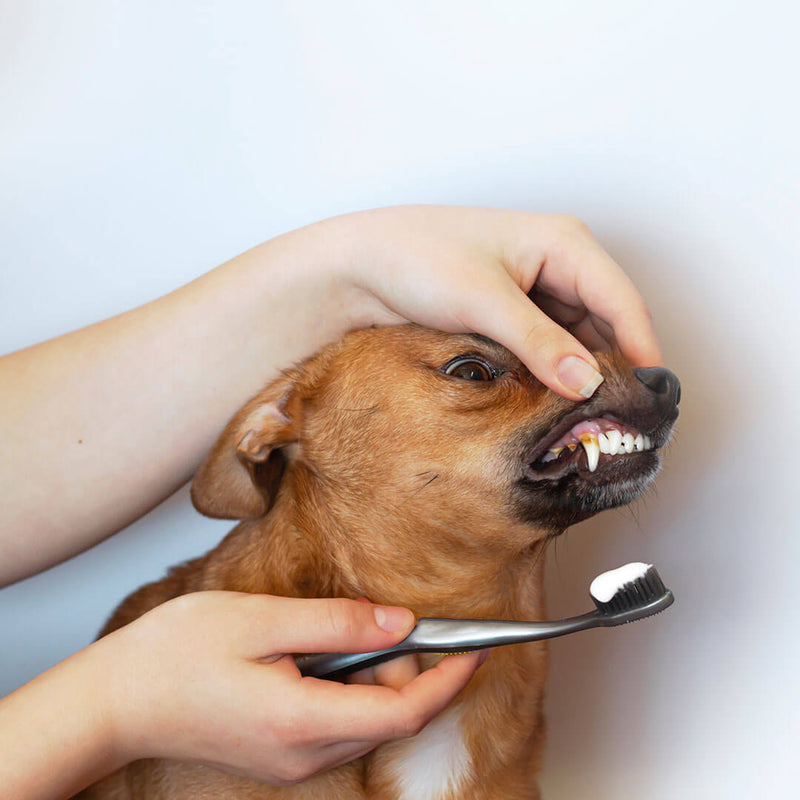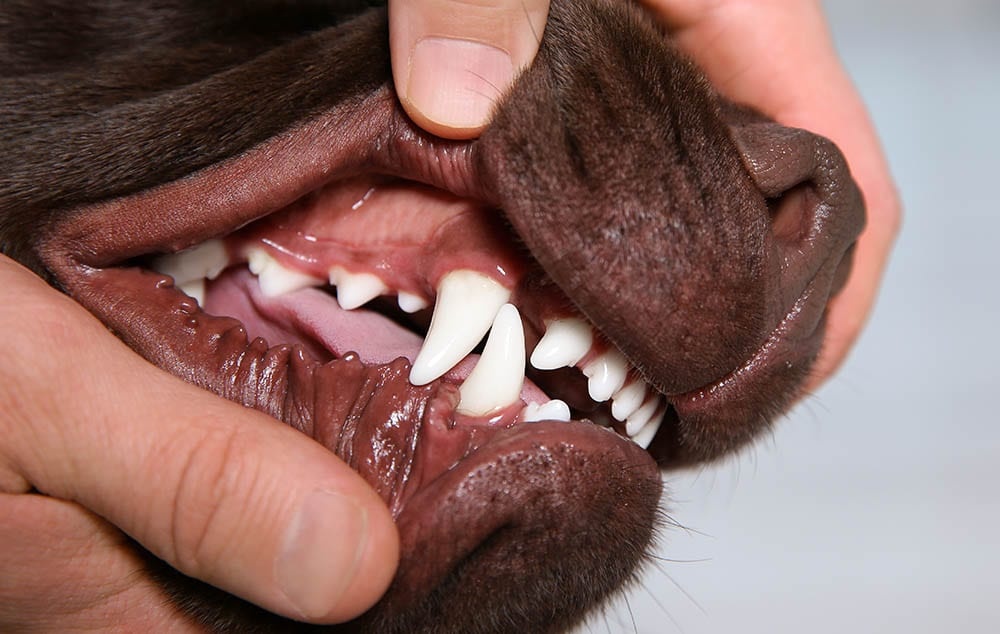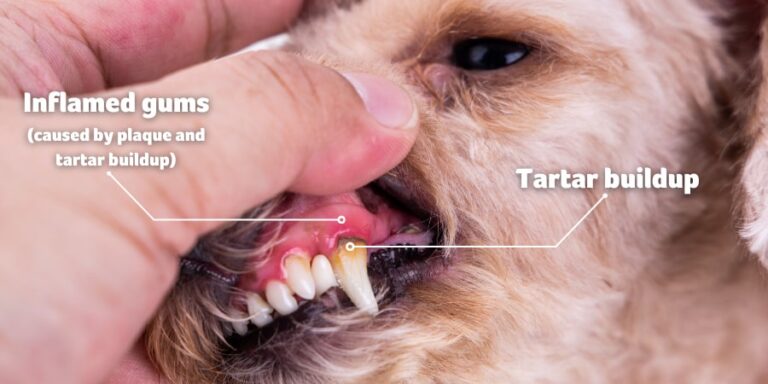To remove plaque on a dog’s teeth, brush them regularly and offer dental chews or toys. Plaque buildup can lead to dental issues in dogs, so it’s important to take steps to prevent it.
Regular brushing and providing dental chews can help keep plaque at bay and promote good oral health for your furry friend. Taking care of your dog’s dental health is imperative for their overall well-being. Plaque buildup can lead to periodontal disease, causing pain and discomfort for your pet.
By implementing a regular dental care routine and ensuring they have access to plaque-fighting products, you can help prevent dental issues and keep your dog’s teeth and gums healthy. We will discuss effective methods to get rid of plaque on your dog’s teeth and the importance of maintaining good oral hygiene for your canine companion.

Credit: petzpark.com.au
Importance Of Dental Health For Dogs
Dental health is vital for dogs as it helps prevent plaque buildup on their teeth. Discover effective techniques to eliminate plaque and maintain your dog’s oral hygiene.
Dental health is not just important for humans; it is equally crucial for our furry friends. Just like us, dogs can suffer from a variety of dental problems, including plaque and tartar buildup, gum disease, and tooth decay. Unfortunately, many pet owners overlook the importance of maintaining their dog’s dental health, leading to painful and potentially dangerous oral conditions.
Preventing Dental Disease
Preventing dental disease in dogs is an essential part of responsible pet ownership. By taking proactive steps, you can ensure your canine companion maintains a healthy and happy smile for years to come. Here are a few tips to help you prevent dental disease in your furry friend:
- Regular brushing: Just like with humans, brushing your dog’s teeth is the most effective way to keep their oral hygiene in check. Aim for daily brushing using a dog-specific toothbrush and toothpaste, as human toothpaste can be harmful to dogs.
- Healthy diet: Providing your dog with a balanced diet that promotes good dental health is crucial. Feeding them high-quality dog food, avoiding sugary treats, and incorporating dental chews or toys can help keep their teeth clean and strong.
- Regular dental check-ups: Just like humans, dogs benefit from regular dental check-ups. Make sure to schedule regular visits with your veterinarian for professional cleaning and examination to catch any potential dental issues early on.
Understanding Plaque And Tartar
To effectively combat plaque and tartar buildup, it’s important to understand what they are and how they affect your dog’s dental health.
| Plaque | Tartar |
|---|---|
| Sticky film composed of bacteria, saliva, and food particles that coats the teeth | |
| Can lead to gum inflammation, bad breath, and tooth decay if not removed | Difficult to remove through brushing alone and often requires professional cleaning |
Plaque and tartar are common problems in dogs, but with proper care and regular dental maintenance, you can help prevent them from causing further damage to your dog’s teeth and oral health.
Remember, a healthy mouth is crucial for your dog’s overall well-being. By taking the necessary steps to prevent dental disease and understanding the importance of oral hygiene, you can help your beloved pet maintain optimal dental health for a lifetime of happy smiles.
Credit: www.wikihow.com
Signs Of Dental Problems In Dogs
Identifying the signs of dental problems in dogs is crucial for maintaining their overall health and well-being. Proper dental care is essential to prevent plaque buildup and other oral issues that can lead to discomfort and more serious health issues.
Bad Breath
Persistent bad breath in dogs can be a sign of dental problems, including plaque buildup. When left untreated, the bacteria in the mouth can lead to more severe conditions. Regularly checking your dog’s breath can help detect early signs of dental issues.
Excessive Drooling
Excessive drooling beyond what is typical for your dog may indicate dental problems. This can be a result of pain or discomfort due to plaque or gum disease. Monitoring your dog’s drooling and seeking veterinary care if it increases is crucial.
Red Or Swollen Gums
Redness or swelling of the gums can be an indication of periodontal disease or other dental issues. These symptoms can be accompanied by bleeding or sensitivity. Regularly examining your dog’s gums can help in identifying these issues early.
Home Remedies For Removing Plaque
When it comes to your dog’s dental health, plaque can be a serious concern. Luckily, there are several home remedies that can help remove plaque from your furry friend’s teeth, promoting better oral hygiene and preventing dental issues. Here are some effective methods to combat plaque buildup in your dog’s mouth using simple and natural home remedies:
Brushing Your Dog’s Teeth
Regular brushing is crucial for maintaining your dog’s dental health. Use a canine toothbrush and toothpaste specifically designed for dogs. Gently brush your dog’s teeth in a circular motion, focusing on the gum line and back teeth. Aim to brush your dog’s teeth at least three times a week to effectively remove plaque and prevent tartar buildup.
Using Dental Chews Or Treats
Dental chews and treats are excellent options to help reduce plaque in your dog’s mouth. Look for products that carry the Veterinary Oral Health Council (VOHC) seal, indicating that they have been clinically proven to reduce plaque and tartar. These chews and treats work by mechanically scrubbing the teeth as your dog chews, helping to dislodge plaque and prevent its accumulation.
Adding Dental Water Additives
Dental water additives are another effective way to combat plaque in your dog’s mouth. These additives can be simply added to your dog’s water bowl and work by altering the pH level in your dog’s mouth to make it less hospitable to plaque-forming bacteria. Look for natural and safe dental water additives specifically formulated for dogs to support their oral health.
Professional Options For Plaque Removal
Regular dental care is essential to maintain your dog’s oral health and prevent the buildup of plaque. While regular brushing and dental chews can help, sometimes professional intervention is necessary for more stubborn plaque. Here are some professional options for plaque removal:
Regular Dental Check-ups
Just like humans, dogs need regular dental check-ups to ensure their teeth and gums are in good condition. During a dental check-up, a veterinarian will examine your dog’s oral health, looking for signs of plaque, tartar, gum disease, or any other dental issues. Regular check-ups allow early detection and intervention, preventing further complications.
Professional Dental Scaling And Polishing
Professional dental scaling and polishing is a more intensive procedure for plaque removal. This treatment is typically performed under anesthesia to ensure your dog remains calm and comfortable throughout the process. It involves removing the plaque and tartar buildup from your dog’s teeth using specialized dental instruments. After scaling, the teeth are polished to smooth out any rough surfaces that could attract plaque and bacteria. This procedure not only removes existing plaque but also helps prevent future buildup.
During the scaling and polishing process, the veterinarian may also take dental X-rays to evaluate the health of the teeth below the gumline. This helps identify any hidden dental issues that may require further treatment.
It is important to note that professional dental scaling and polishing should only be performed by a qualified veterinarian or veterinary dentist. Avoid attempting to remove plaque yourself using sharp objects, as this can cause injury to your dog’s gums or teeth.
Once the professional plaque removal is complete, your veterinarian may recommend additional steps to maintain your dog’s oral health, such as regular brushing, dental chews, or specialized dental diets. Following their advice will help minimize plaque formation and maintain a healthy smile for your furry friend.
Preventing Plaque Build-up In The Future
Preventing plaque build-up in the future is crucial for maintaining your dog’s dental health. By establishing a regular dental care routine, choosing the right food, and supplementing with dental products, you can help keep your furry friend’s teeth clean and free of plaque.
Regular Dental Care Routine
Establishing a regular dental care routine is one of the most effective ways to prevent plaque build-up in your dog’s teeth. Here are some essential steps to include in your routine:
- Brushing: Brush your dog’s teeth regularly using a dog toothbrush and toothpaste specially formulated for pets. Aim for at least two to three times per week.
- Professional Cleanings: Schedule regular dental cleanings with your veterinarian to remove any stubborn plaque and tartar that brushing alone cannot eliminate.
- Regular Inspection: Regularly inspect your dog’s teeth and gums for any signs of plaque, tartar, or gum disease. If you notice anything unusual, consult your veterinarian.
Choosing The Right Food
The food you choose for your dog plays a significant role in preventing plaque build-up. Consider the following factors when selecting the right food:
- Dental-Friendly Formulas: Look for dog foods specifically designed to promote dental health. These formulas often contain ingredients that help clean teeth, reduce plaque, and freshen breath.
- Texture: Opt for dry or semi-moist dog food instead of wet food. The chewing action required to consume dry kibble helps to scrape away plaque from the teeth.
- Quality Ingredients: Ensure the dog food you choose is made with high-quality ingredients to support overall dental health and maintain strong teeth.
Supplementing With Dental Products
In addition to a regular dental care routine and the right food, you can also supplement your dog’s oral hygiene with dental products. Here are some options to consider:
- Dental Chews: Dental chews, such as specially designed dog treats or toys, can help reduce plaque build-up by encouraging chewing and scraping away tartar.
- Dental Sprays or Gels: Dental sprays or gels are formulated to combat plaque and freshen breath. Simply apply these products to your dog’s teeth and gums as directed.
- Water Additives: Consider using water additives designed to help prevent plaque and tartar accumulation. These additives are easy to use and can be added to your dog’s drinking water.
By incorporating these preventive measures into your dog’s dental care routine, you can help maintain their oral health, minimize plaque buildup, and ensure a happy, healthy smile for years to come.

Credit: www.nomnomnow.com
Frequently Asked Questions For How To Get Rid Of Plaque On Dog’s Teeth
How Can I Remove Plaque From My Dog’s Teeth At Home?
To remove plaque from your dog’s teeth at home, you can use toothbrushes and toothpaste specially designed for dogs. Regular brushing helps prevent plaque buildup. You can also provide dental treats and toys that promote chewing, which helps remove plaque.
Additionally, feeding a balanced diet and scheduling dental cleanings with a veterinarian are essential for plaque control.
Is There A Way To Naturally Prevent Plaque In Dogs?
Yes, there are natural ways to prevent plaque in dogs. Feeding raw bones, such as raw chicken necks or raw beef bones, can help mechanically remove plaque. Also, feeding dental chews made with natural ingredients can promote oral health. Regular tooth brushing with natural toothpaste can further prevent plaque buildup and maintain your dog’s dental hygiene.
When Should I Take My Dog To The Vet For Plaque?
It is recommended to take your dog to the vet for a dental evaluation if you notice signs of plaque, such as bad breath or yellowing of teeth. Routine dental check-ups are important to catch any dental problems early on.
The vet will assess the level of plaque accumulation, perform a thorough cleaning, and provide advice on maintaining your dog’s dental health.
Conclusion
Maintaining good oral hygiene for your dog is essential to prevent plaque build-up and potential dental issues. By incorporating regular brushing, feeding dental-friendly foods, and offering chew toys, you can effectively tackle plaque and maintain your furry friend’s dental health.
By following these tips, you can have peace of mind knowing that your dog’s teeth are clean and healthy, promoting overall well-being. Remember, a happy and healthy smile starts with proper dental care!



